Steaming Vegetables
A reminder of what a great cooking technique steaming vegetables is. Fast and flexible for the win.
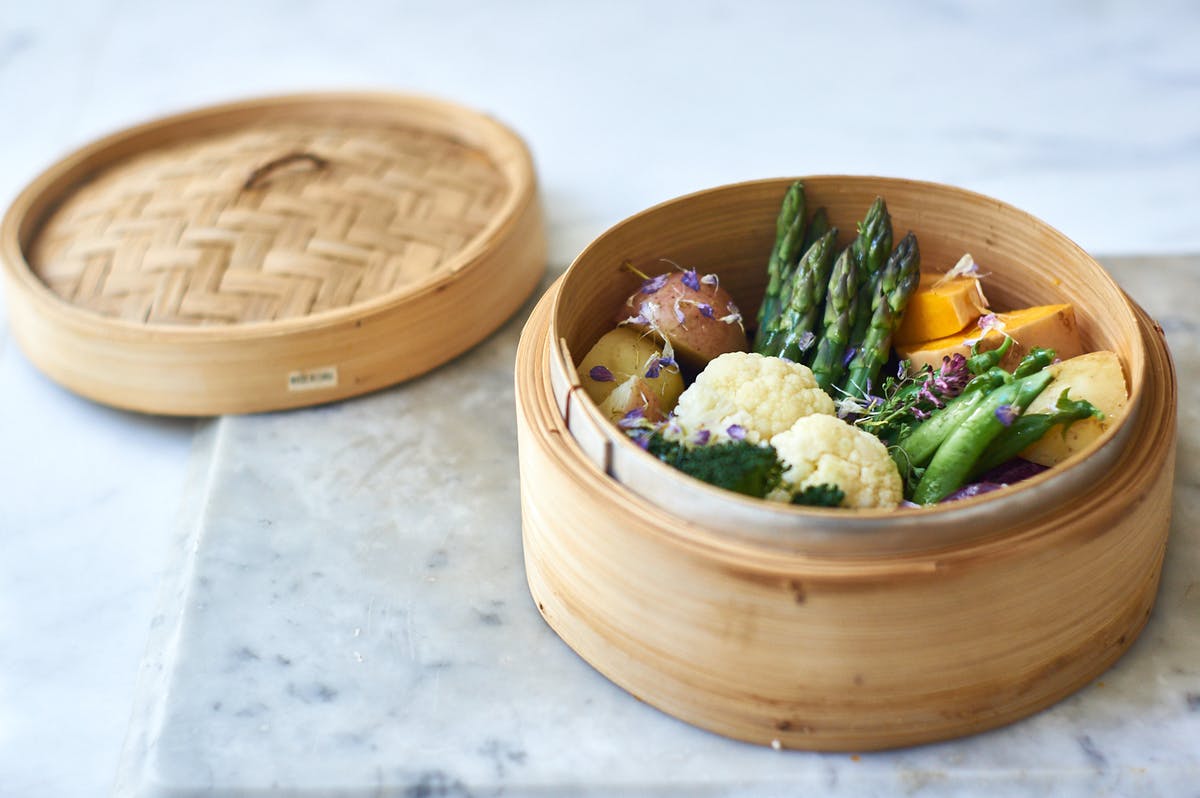
Steaming vegetables is an underutilized cooking technique in my kitchen. After my last trip to Japan, I pledged to remedy the issue. This simple, direct method of cooking is one of the reasons I love eating in Japan. I mean, let's be honest, I probably like steamed vegetables more than most, but I enjoy them exponentially more there. Somehow, many of the things I love about traveling there are summed up in this simple preparation.
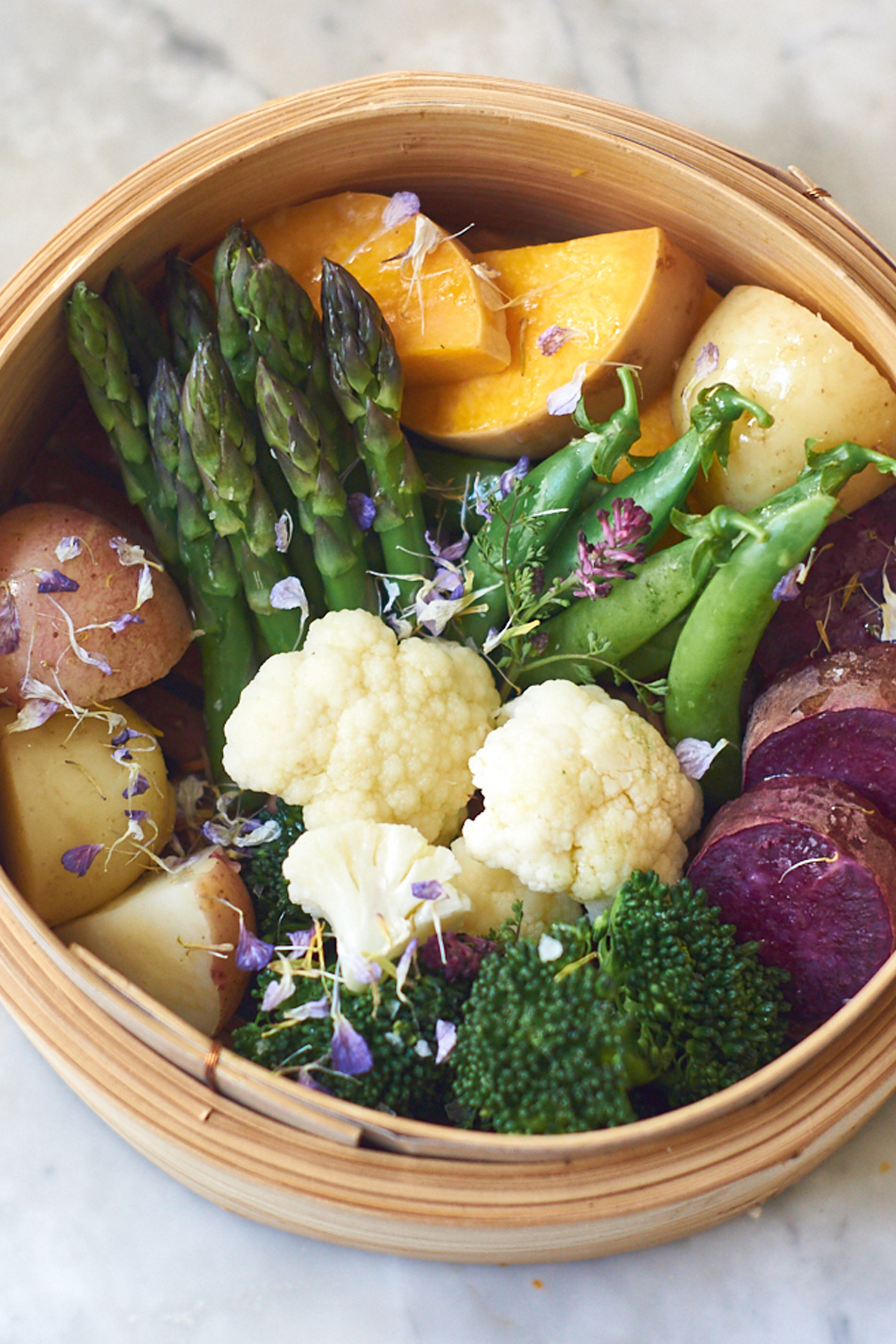
I'd often receive a sampling of seasonal produce as part of a combination lunch. The vegetables arrived at the table beautifully arranged in the bamboo basket they were steamed in. I'd work my way through a rainbow of vibrant, tender potatoes, squash, mushrooms, broccoli rabe, and the like, sometimes adding a pinch of zesty shichimi togarashi, but more often than not, a casual toss of a few grains of salt would be all. Each meal was a vibrant, satisfying reminder of just how good vegetables can be when prepared simply with care and intent. Their natural flavors coming through direct and perfect.
Break out the Steamer!
After this past trip, my inexpensive, tri-level bamboo steamer was promptly dusted upon my arrival home, and put into proper rotation. The thing that never ceases to surprise me is the speed even the most hearty chunks of root vegetables or squash become tender - ten minutes, often less.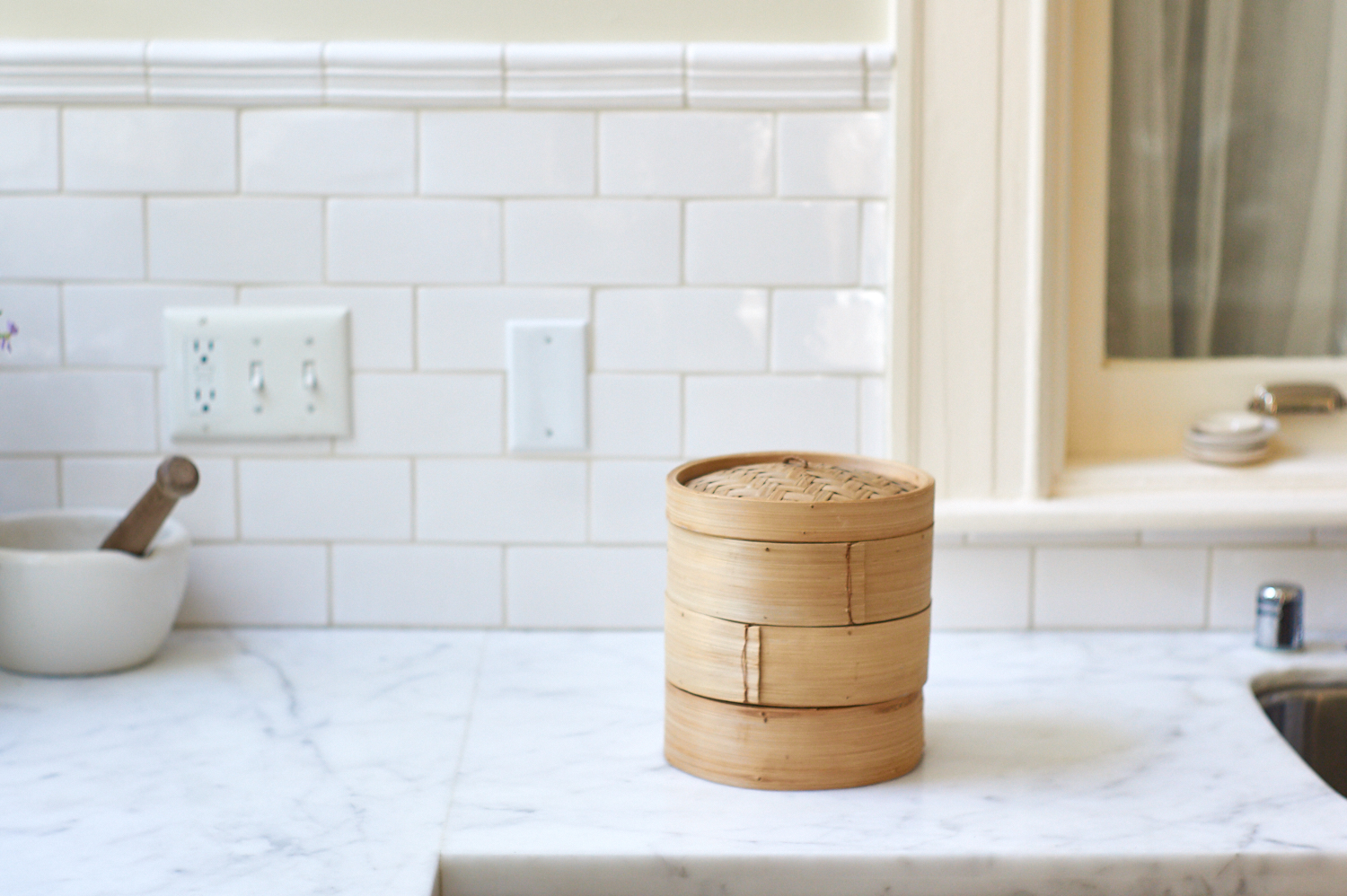
Choosing a Steamer
Bamboo steamers are easy to come by, and relatively inexpensive. Go this route if you aren't sure how often you'll use your steamer. The one downside is they take up a good amount of storage space, not much more than a big pot, but still. These steamers are available in a range of diameters, and are made of interlocking trays intended for stacking on atop of the other. Placed above simmering water, the steam from the water rises through the trays and cooks the food. It's a simple premise that works astoundingly well. I use three trays, but you can certainly go up or down a level.
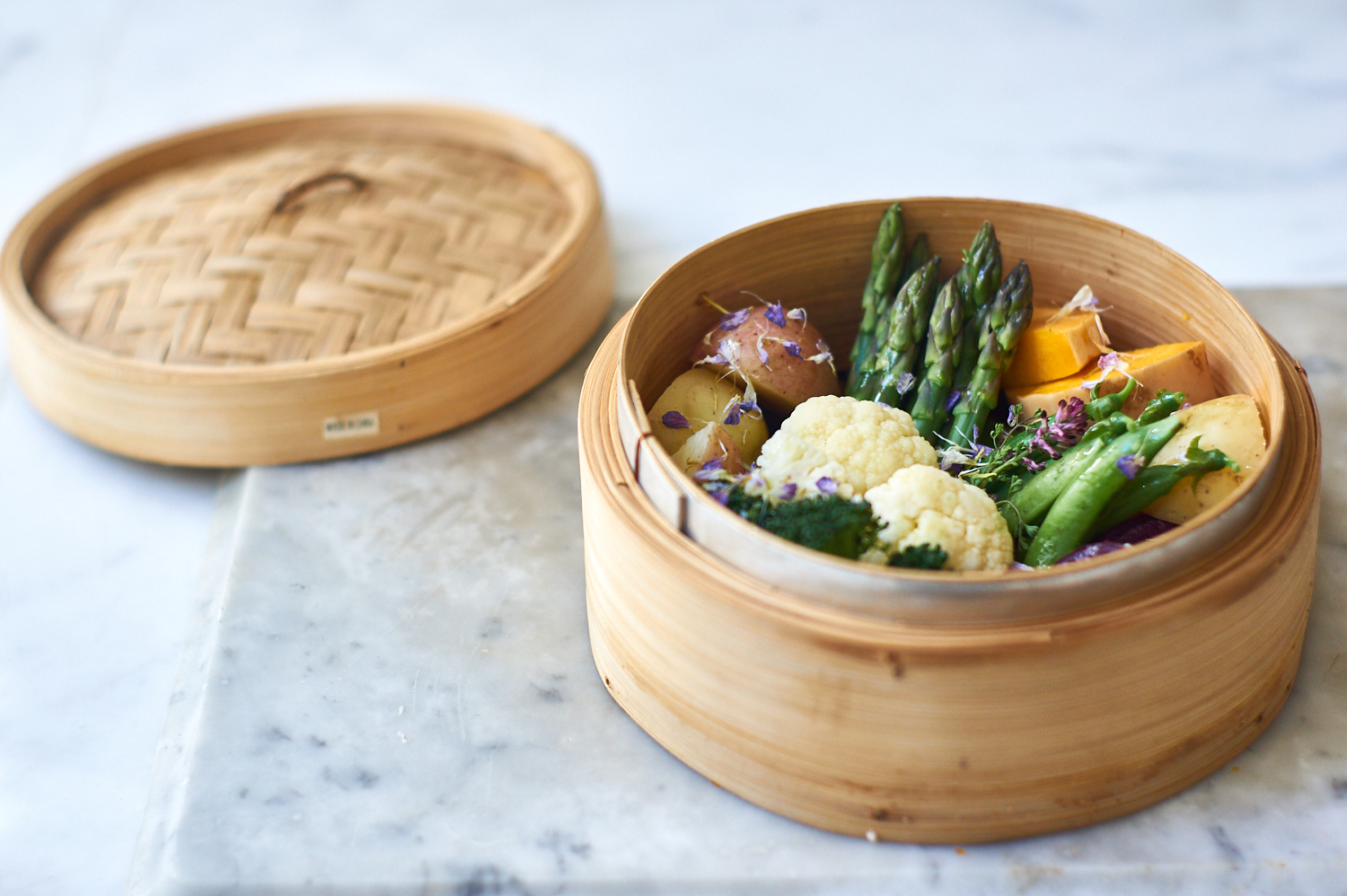
I eventually graduated to a ceramic steamer, and also picked up this Mushi Nabe, donabe steamer. Both are nice because you can make a broth or curry in the base, and then use steam the ingredients up above at the same time. Any of the steamers make a nice jump from cooking to table. If you want to expand beyond steaming vegetables, you can also steam everything from dumplings and tofu to eggs, tamales and certain rices.
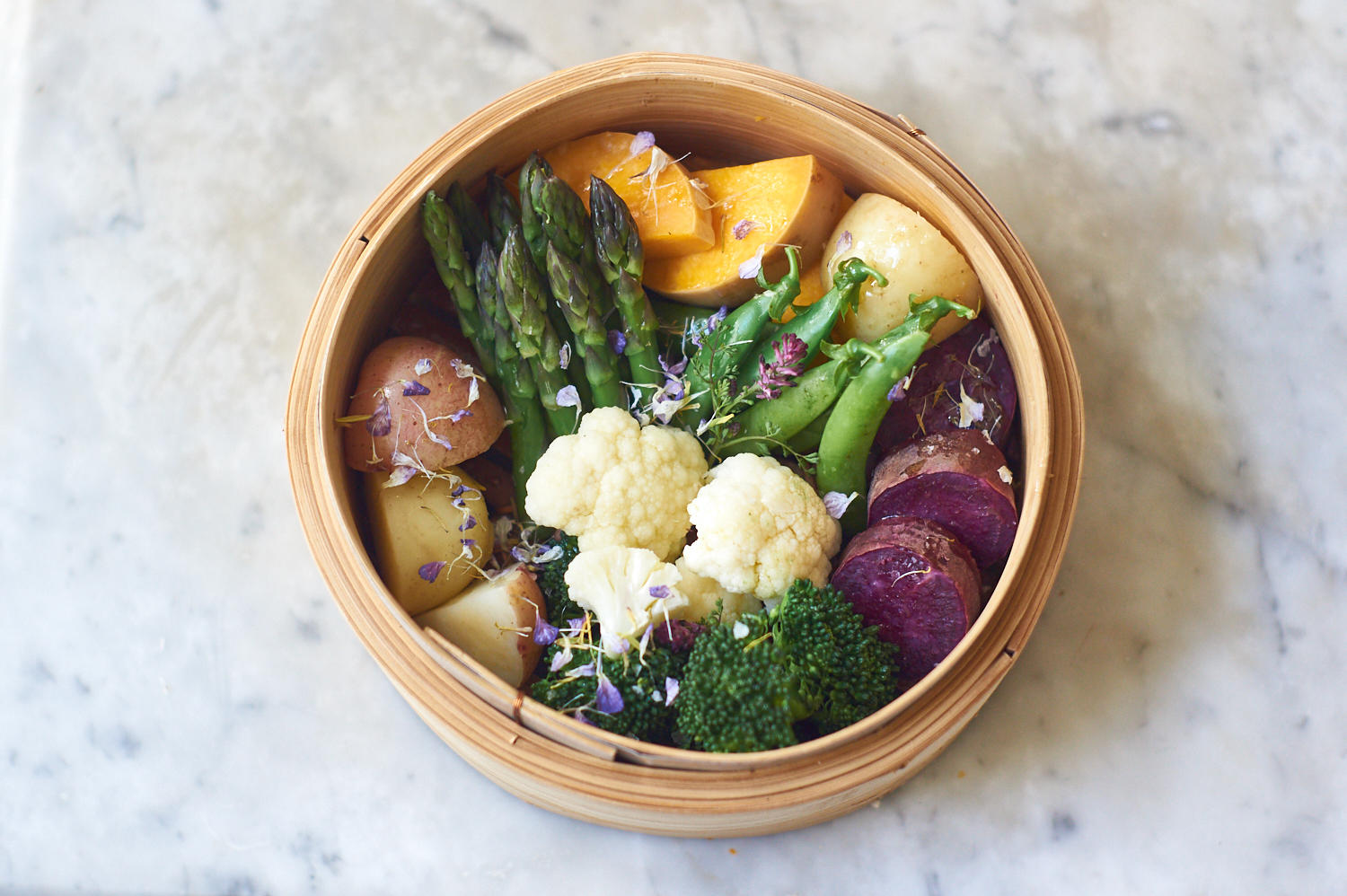
Some Tips on Steaming Vegetables:
- While steaming with water is most common, I've also played around using miso broth, vegetable broth, vegetable dashi, or tea in place of water. Each imparts a different scent and flavor to the vegetables. More times than not though, I use water.
- Arrange your slowest cooking vegetables in the bottom basket, working up to the quickest. Another time saver is to get your densest, slowest cooking vegetables started in in the bottom tray, while you prep the quicker cooking vegetables for the mid and top baskets. Place the lid on whatever basket is on top at the time.
- Some people line their steamers with cabbage leaves or parchment. I don't bother, placing the vegetables directly on the steamer instead. I like how it seems to keep the steam circulating. A quick scrub with hot water and the rough side of a sponge makes clean-up simple.
- When using the bamboo steamer, you can use a wok (steamer sits above the simmering water) or wide skillet (I set the steamer directly in a shallow skillet of simmering water)...A wok is more traditional, and easier on your steamer, but both techniques work well.
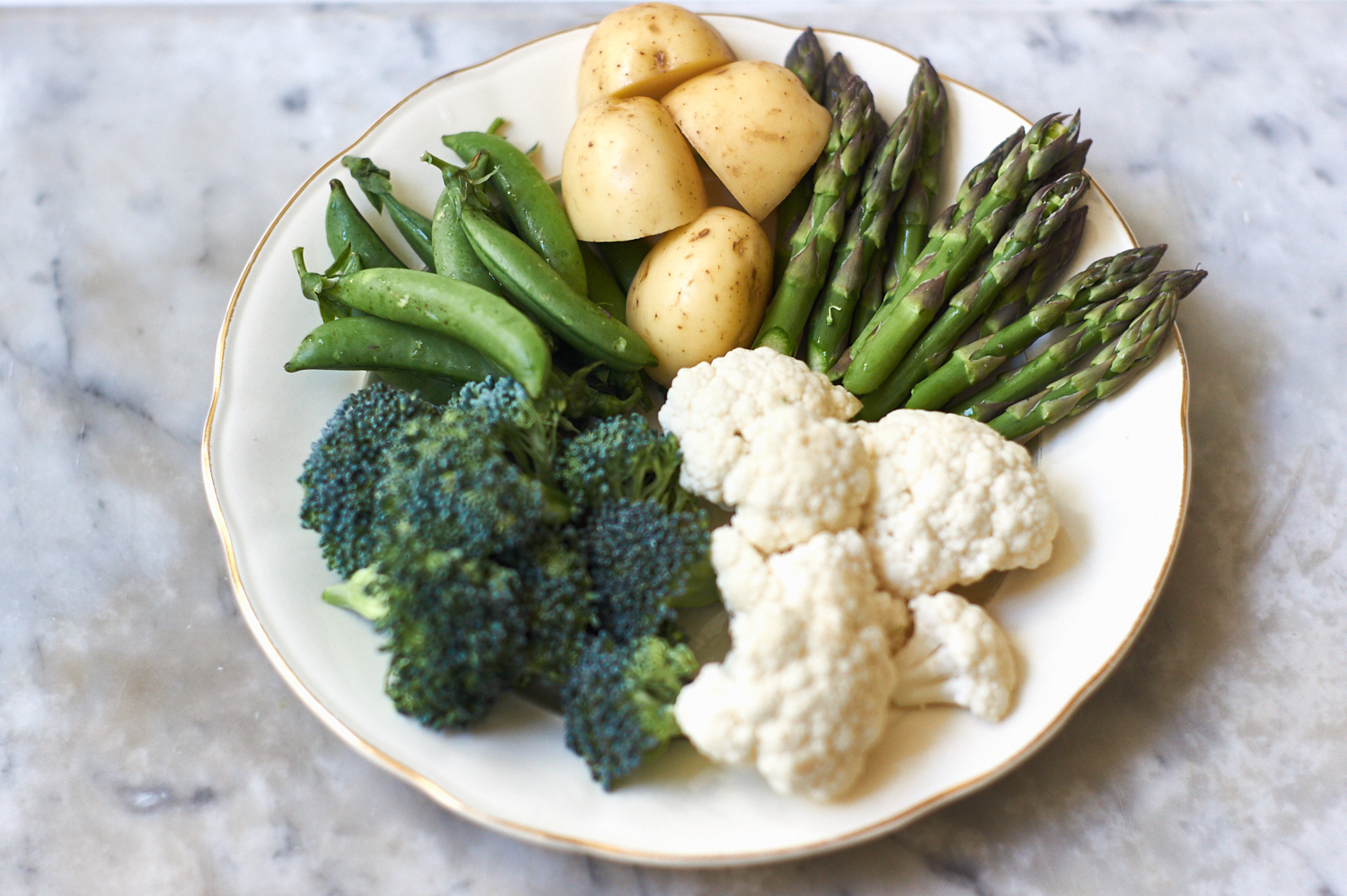
So, less of a recipe, and more of a reminder today of how good the most basic preparations can be. A few years after I initially posted this, I did another deeper dive into Using your Underutilized Steamer. Have fun! -h
Steaming Vegetables
This is how I put together a rainbow sampling of steamed vegetables. I use a three-tiered bamboo steamer, the sort that is available in most culinary shops. But, if you only have two-tiers, that's fine!
- a sampling of seasonal vegetables
- flaky sea salt
- to finish: good olive oil, a few drops of toasted sesame oil, or shallot oil
- ponzu sauce
-
Wash your vegetables well, and cut them into bite-sized pieces. I tend to leave peels on, but it is a personal preference. Arrange them, in a single layer, in steamer trays according to needed cooking time. For example:
-
Bottom tray: equal-sized chunks of slower-cooking vegetables. For example: sweet potato, potato, winter squash, beets. These usually cook through in about ten minutes. Middle-tray: equal sized pieces of broccoli, cauliflower. Top-tray/last minute: asparagus, fava beans (inner pods), snap peas.
-
Bring an inch of water to a simmer in a skillet large enough to accommodate the diameter of your steamer. Alternately, you can use a wok. The water should not be so high that it makes contact with the vegetables when the steamer is placed in the skillet - do a quick test if you're unsure, and remove some water if needed.
-
The goal here is to have your vegetables perfectly cooked and ready to serve just before you sit down. And, ideally, all of the vegetables finish cooking at the same time. Here's how you do it. Roughly ten minutes before you're ready to serve, place the slow-cooking, bottom tray vegetables over the simmering water, covered. Let them steam there until they're about 2/3 cooked, about 6-7 minutes. Test, and cut into any root vegetables toward the end to make sure they're going to be cooked through.
-
The mid tray only needs 3-4 minutes, so add that next, moving the lid up a level. And the top tray vegetables, like snap peas and asparagus, just need a kiss of steam to brighten, barely a minute. Add that last. Or if you only have two baskets, add these to the broccoli/cauliflower basket to finish. You'll have to make slight adjustments based on the sizes of your vegetables, but this is the general idea. Cook them until they're bright, just tender, and taste good to you.
-
I like to quickly arrange the steamed vegetables, nested, in one basket to serve along with a drizzle of good oil - toasted sesame, shallot, olive oil, herb, etc. With a sprinkle of flaky sea salt. Or a nice drizzle of ponzu.
Serves 4


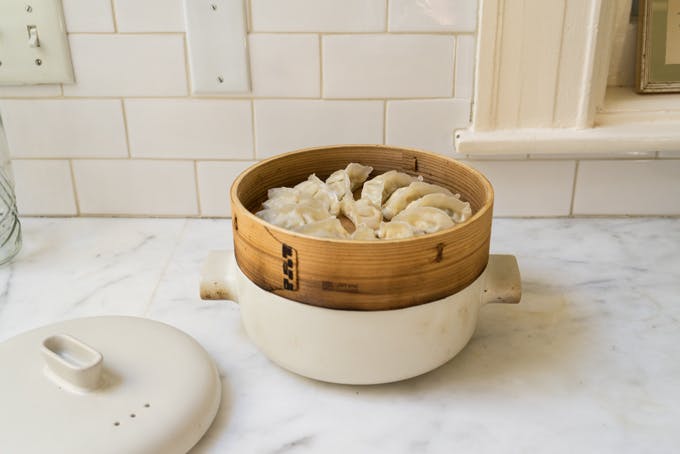

Post Your Comment
Comments
What a stunning photo of all the veggies in the tray at the top. It makes me want to eat that now! Wonderful!
I bought a steamer at a yard sale, brand new. I keep looking at it but never use it. You have inspired me to get started.
I love this primer on vegetable steaming, your photographs make ordinary veggies appear sumptuous yet easy to attain. One more reason to visit Japan! Thanks for the post.
Steaming is my default way of preparing vegetables. I have a 3-tier stackable steamer (you can put those veg that don't steam so well, like green beans or Brussels sprouts, in the bottom with the water). I also have a microwave steamer which is even quicker - you just pour a cupful of boiling water over the vegetables and 5 minutes or fewer in the microwave, and they are done!
I love how simple this is and how great it looks!
I would love to ho to Japan! It's so cool hearing about it, and with steamed vegetables everywhere. I'm totally in!
lovely.
Thank you for such a practical post, Heidi. Do metal steamers work the same or do you only recommend the bamboo ones?
HS: It depends on the shape, Janet. But the premise is the same. I happen to have a bamboo steamer, but I have nothing against the metal ones.
So good for the health, such a plate!
Steaming vegetables so simple yet so many things can go wrong. Thanks for the details, super useful!
I like your tips :) I had no idea that the slower cooking veggies should be on the bottom.
Simply stunning. I, too, love steamed veggies, and your photographs just make me want to gobble them up that much more. I love their freshness and lightness. Such great purity in every bite. And yay for Japan!
I love how vibrant and colourful the vegetables look when lightly steamed. I've never used a bamboo steamer before but I might have to hunt one down and give this a try.
I love how the steamed vegetables are presented, not to saggy. I can feel the crunchiness of it even with the pictures. Would you recommend a dip for these?
HS: Hi Jarome, you could make a dip, but I like them with just a little drizzle of olive or toasted sesame oil + salt.
Stupid question but what do you mean by a cooking skillet? Is it just a big pot, like what you boil pasta in? If so how does the bamboo steamer not fall down and get wet?! Sorry I'm very, very new to cooking, but would love an answer.
HS: Hi Bea, more like the type of pan you might fry a couple of eggs in - one with a wide diameter. You set the steamer in the shallow simmering water here, and it's fine if it gets wet.
I like this preparation too. Sometime I'll make little bundles of napa cabbages leaves or add carved radishes like they do at Benihana when you order the steamed veggies in the metal steamer.
I love how vibrant the vegetables look! I have some very traditional bamboo steamers at my disposal, but I've always been afraid to test them out and ruin my ingredients. Now, you've inspired me to pull them out of storage and experiment a little. Thanks!
Thanks for the details about how you steam your veggies with a bamboo steamer. I've always thought about getting one and now I want to try it out!
Looks simply delicious. Chunks of ginger in the steaming liquid also adds a nice flavor.
Steamed veggies sound better and better the less sugar we eat. And now that it's summer, it's actually fun to cook them again, instead of making cabbage and potatoes all the time.